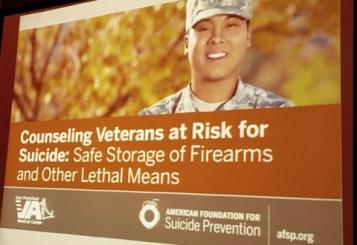By Matthew Coulson | Originally published on SFVAHCS News

On March 4, SFVAHCS teamed up with the American Foundation for Suicide Prevention to host a conference entitled "Counseling Veterans at Risk for Suicide: Safe Storage of Firearms and Other Lethal Means."
On March 4, SFVAHCS teamed up with the American Foundation for Suicide Prevention to host a conference entitled "Counseling Veterans at Risk for Suicide: Safe Storage of Firearms and Other Lethal Means." The event was unique in its inclusion of veterans, veterans’ family members, health care providers, public health researchers, suicide prevention advocates, and most crucially, gun advocates.
“It’s the first time we’ve brought all of these groups together to talk about this important issue,” said conference organizer Russell Lemle, PhD, chief psychologist at SFVAHCS and clinical faculty member in the UCSF Department of Psychiatry. “We’re finding ways to counsel our veterans on safe storage for their firearms to prevent suicide. It’s both pro-gun and pro-suicide prevention.”
“Guns account for more than half of suicides in America, and for more than two-thirds of veteran suicides,” said Lemle. Research shows that about 85% of suicide attempts by firearm are successful – a much higher completion rate than other methods. Lemle notes that suicide is often an impulsive decision, and that the vast majority of suicide attempt survivors do not attempt suicide again. Limiting immediate access to firearms for veterans in crisis can save lives. “Safe gun storage is one of the most important ways to prevent suicide,” he added.
Much of the conference focused on educating mental health providers about counseling at-risk veterans on safe storage of firearms and other lethal means. However, friends and loved ones are also key to suicide prevention. “Peers play a crucial role in helping promote lethal means safety,” explained fellow UCSF Psychiatry faculty member Megan McCarthy, PhD, SFVAHCS Lethal Means Safety Coordinator and another organizer of the conference. “Veterans sometimes feel reluctant to talk to their providers about their access to guns when they’re having a mental health crisis. We’ve learned that some veterans worry that we want to take their guns. We have great respect for the important role guns play in many veterans’ lives. We want veterans to keep their guns, and we want to keep veterans safe when they’re in crisis."
"If you have a buddy who you’re worried may be in trouble, it’s worth it to say, ‘Hey, can we talk about ways to store your gun safely until you’re feeling better?’”
If you are worried about a veteran who may be at risk for suicide, McCarthy offers the following advice:
- In the event of an emergency, always call 911.
- Call the Veterans Crisis Line – 1-800-273-8255(TALK) and press 1. This resource is available to concerned friends and family members as well as veterans, and it can help you initiate difficult but important conversations with loved ones.
- Talk non-judgmentally with the veteran. Share your concerns and let him or her know that you are there to provide support, and to help find solutions.
- Talk with the veteran’s friends. Peer support, especially from fellow veterans, can be crucial in convincing a veteran who is at risk for suicide to safely store firearms.
- Accompany the veteran to a visit with a mental health provider. Your presence can help facilitate lifesaving conversations about lethal means safety.
- Remember, one conversation can save a life!
About UCSF Psychiatry
The UCSF Department of Psychiatry and the Langley Porter Psychiatric Institute are among the nation's foremost resources in the fields of child, adolescent, adult and geriatric mental health. Together they constitute one of the largest departments in the UCSF School of Medicine, with a mission focused on research (basic, translational, clinical), teaching, patient care, and public service. UCSF Psychiatry has an organizational structure that crosses all major UCSF sites - Parnassus, Mission Bay, Laurel Heights, Mt. Zion, Zuckerberg San Francisco General Hospital and Trauma Center, the San Francisco VA Health Care System, and UCSF Fresno.
About the San Francisco VA Health Care System
The San Francisco VA Health Care System is a comprehensive network that provides health services to veterans through the San Francisco VA Medical Center (SFVAMC) and six community-based outpatient clinics in Santa Rosa, Eureka, Ukiah, Clearlake, San Bruno, and downtown San Francisco. It has a long history of conducting cutting-edge research, establishing innovative medical programs, and providing compassionate care to veterans. SFVAMC has been affiliated with the UCSF School of Medicine for over 50 years, and all physicians are jointly recruited by SFVAMC and the UCSF School of Medicine.





